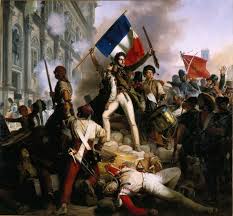Passive juridical citizen or agentic human being? This was one of the political and ideological tensions explored by Massimiliano Tomba, Professor of Political Philosophy at the University of Padova, in his presentation ‘Insurgent Universality’ on November 6th at the Advanced Research Collaborative (ARC) seminar. The room was filled to capacity with faculty and students eager to hear Professor Tomba speak, and on his birthday no less (Happy Birthday!).
Dr. Tomba presented two starkly distinct notions of human rights, as inscribed in the French Revolution’s 1789 Declaration of the Rights of Man and Citizen, and in the far more radical reworking of this document in 1793, the latter never officially adopted in France. Dr. Tomba explained that the 1789 declaration instantiates a type of juridical “universalism,” in which individuals have rights (e.g. life, liberty, property) that are protected by governments, but which have “limitations,” and can easily be suspended in the interest of “public order and national security,” economic interest, war, or states of declared emergency. In contrast, the 1793 declaration, written by the Jacobins, specifies no limits, instead writing that these freedoms “cannot be suspended, forbidden, nor limited.” The 1793 document emerged from an ongoing process of what Dr. Tomba calls insurgent universality, embodied in the radical praxis of slaves, women, and the poor during the French and Haitian Revolutions.
While the 1789 document safeguards the natural right to “resist oppression,” it also regards resistance to the law as an offense, as the law is taken to be the direct expression of the people’s will. The 1793 declaration does not take this for granted, however, averring that the law must be the expression of the will of the people. Furthermore, one of the most radical articles in the 1793 declaration states “When the government violates the rights of the people, insurrection is for the people and for each portion of the people the most sacred of rights and the most indispensable of duties.” Here, any portion of the people (not just elected representatives) can act as “representatives” of the whole people by rebelling on their behalf. Dr. Tomba argued the poor, women, and slaves at the time did not merely claim the privilege to belong to an unjust order, but rather practiced “disbelonging” to “disorder” the existing unjust order. This is an example of people acting as “citizens” beyond the narrow legal boundaries of “citizenship,” as bestowed by the state.
Dr. Tomba concluded his lively talk by emphasizing that the 1789 framework sees people as passive subjects who lack agency and whose “universal” rights need protecting. On the contrary, the 1793 declaration promotes agentic praxis that may transcend the state and current political order. Given our current crisis of formal democracy in the US and globally, Dr. Tomba suggested that we think about this insurgent “path less travelled” (which is hardly mentioned in post WW2 thinking). In the wide-ranging question and answer session following the talk, discussion took up Marx’s interpretation of related issues of political, social, and human emancipation, as well as questions about the praxis involved in movements like Occupy Wall St., and even the question of animal rights and agency in relation to humans. One important part of the discussion was the question of the Reign of Terror in France as being related to the 1793 way of thinking. Dr. Tomba pointed out that the radical 1793 declaration was actually one of the first casualties of the Reign of Terror, as the new bourgeois state forcibly curtailed liberties amidst the foreign and civil war in France.



